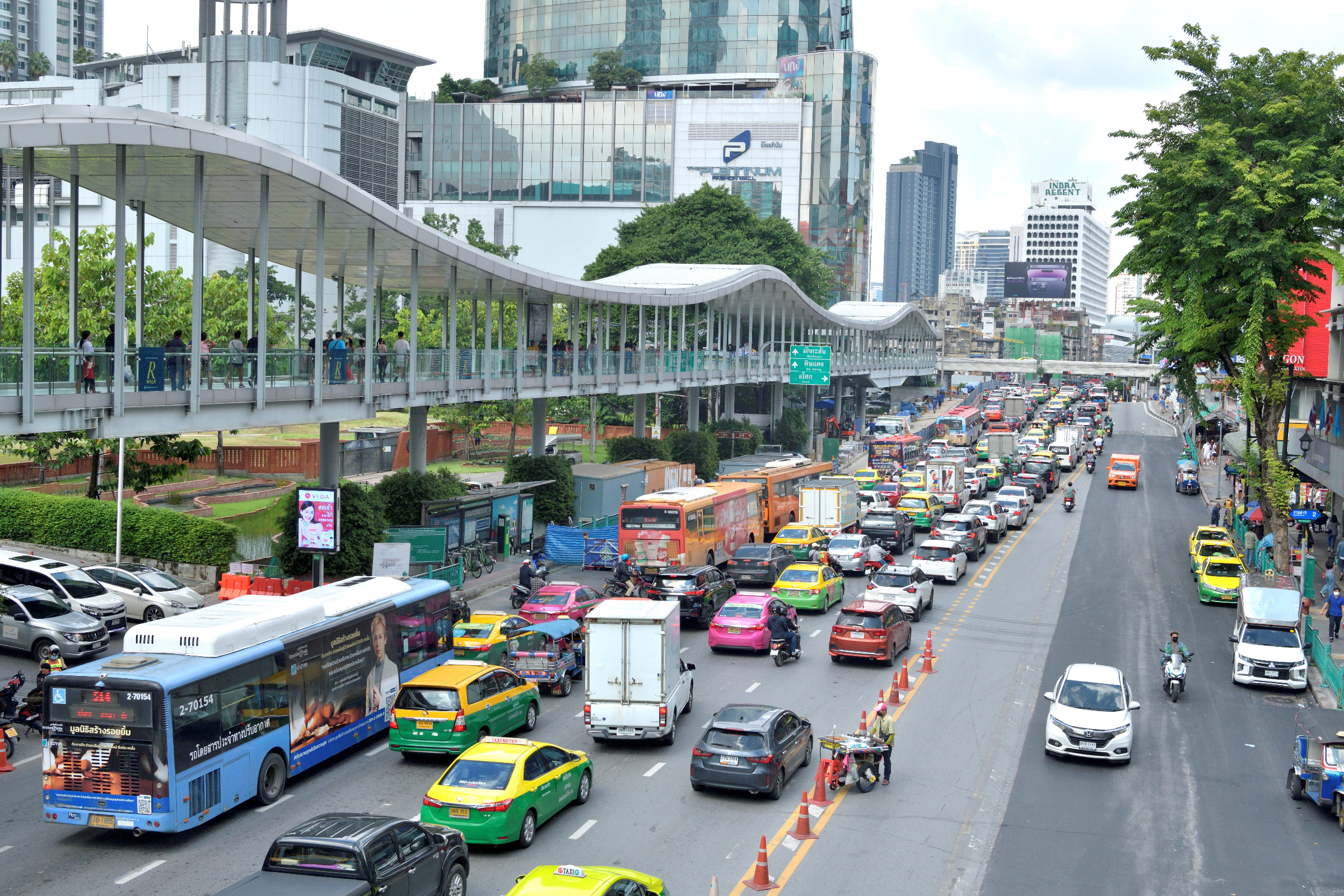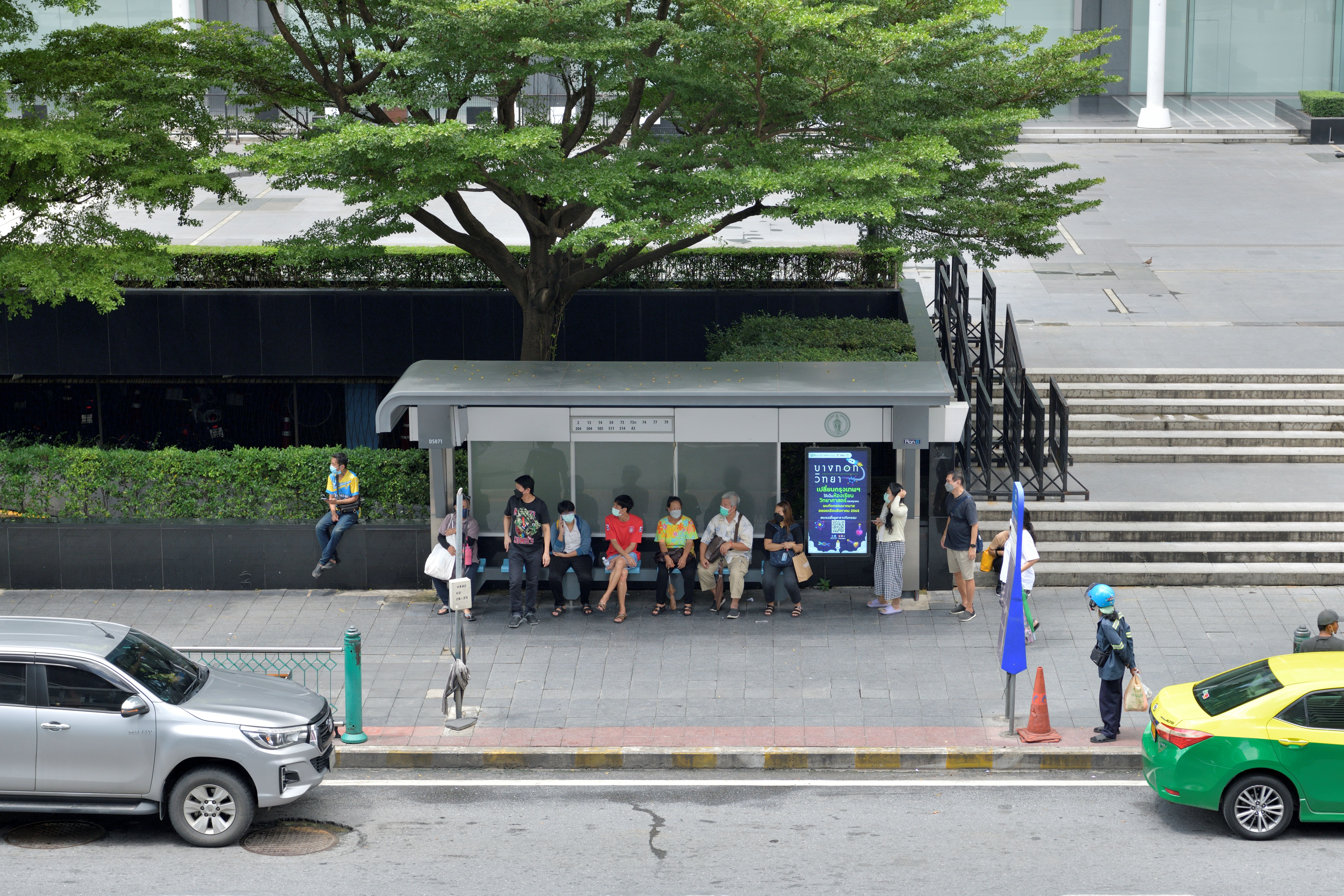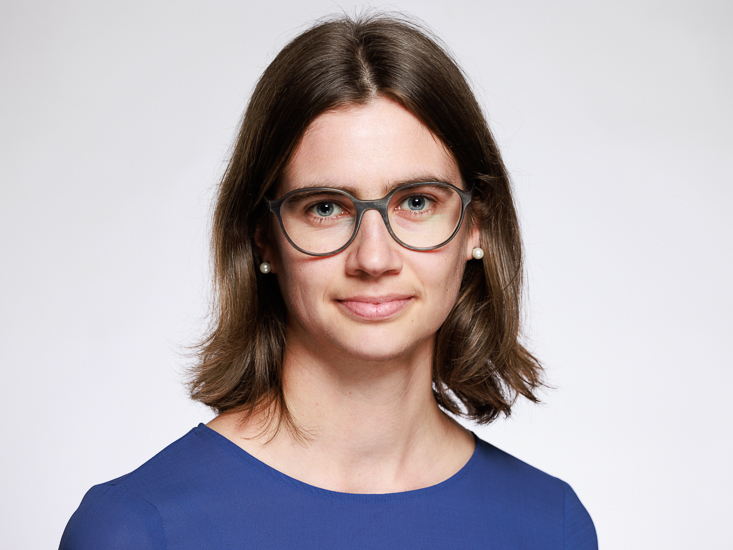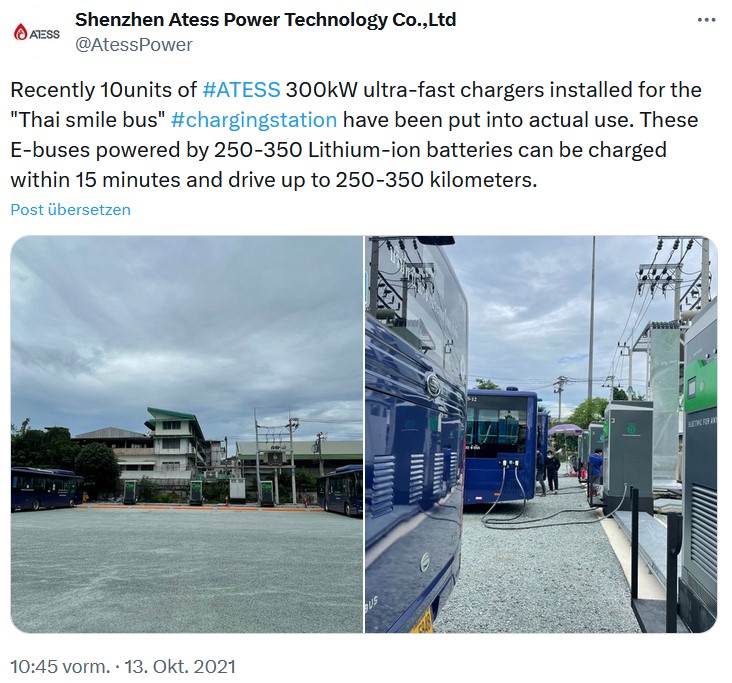Share post now
Investigation
New electric buses in Bangkok – no substitute for climate protection in Switzerland
11.12.2023, Climate justice
Switzerland is celebrating the world's first carbon offset programme under the Paris Agreement that will help the country fulfil its own climate goals. Emissions are being reduced in Bangkok through the co-funding of electric buses. A detailed study by Alliance Sud and Fastenaktion reveals that the investment in electric buses in Bangkok would have taken place by 2030 even without an offset programme.

Bangkok, Rachadamri road, 11th October 2022.
© KEYSTONE / Markus A. Jegerlehner
Under the 1997 Kyoto Protocol, industrialised countries were already able to offset greenhouse gas emissions through projects in the Global South. The Clean Development Mechanism (CDM) was developed for that purpose. The voluntary offset market developed in the wake of the CDM, for example, allowing companies to promote "carbon neutral" products without actually reducing their emissions to zero. Both mechanisms, the CDM and the voluntary mechanism, have repeatedly attracted criticism. Studies and research papers show that many of the associated climate projects eventually turn out to be largely useless, and in some cases, harmful to local communities.
The Paris Agreement, which succeeded the Kyoto Protocol, redefined the carbon market and made a distinction between an intergovernmental mechanism (Article 6.2) and a multilateral mechanism (Article 6.4). Under the Agreement, all countries are required to pursue the most ambitious possible climate policy. Article 6 provides that the aim of both mechanisms is to allow for higher ambitions through such cooperation. In other words, carbon emissions trading should enable countries to lower their emissions more quickly. In the negotiations, Switzerland did much to promote this bilateral trade in certificates, and is now leading the way in operationalising it. Switzerland has already signed a bilateral agreement with 11 partner countries, and another three agreements are expected to be concluded at COP28 in Dubai.
Art. 6 of the Paris Agreement
1. Parties recognize that some Parties choose to pursue voluntary cooperation in the implementation of the nationally determined contributions to allow for higher ambition in their mitigation and adaptation actions and to promote sustainable development and environmental integrity.
[...]
Domestically, the Swiss government and the centre-right parliamentary majority interpret this possibility as carte blanche not to pursue the country's stated goal of a 50 per cent reduction in emissions by 2030, within Switzerland. In other words, the possibility to buy certificates is not being used to reach higher goals. This is eminently clear from the current review of the CO2 Act, as it provides for remarkably limited emission reductions in Switzerland for the 2025–2030 period. Compared to 1990, the rollover of the measures currently in place is expected to yield a 29 per cent reduction by 2030. Under the government's proposal, the new CO2 Act is expected to produce a mere five percentage point reduction, i.e., -34% vis-à-vis 1990. However, if Switzerland is still to achieve its 50 per cent reduction target on paper, it will have to purchase more than two-thirds of the additional reduction needed (15 per cent of 1990 emissions) in the form of certificates from partner countries. The partner countries must forego including those emission reductions in their greenhouse gas balance. As the first chamber, the Council of States proceeded to further water down the government's already weak domestic ambitions in the CO2 Act, i.e., to a less than four percentage point reduction in five years. In so doing it has intensified the pressure, in the short time remaining until 2030, to produce sufficient certificates in partner countries, and this to very exacting qualitative requirements. That this is no simple matter is borne out, not least of all, by the problems mentioned initially, which have already come to light in the CDM and the voluntary carbon market.
Switzerland has approved three offset programmes since November 2022. Two were developed by the United Nations Development Programme (UNDP). The first is intended to reduce the output of methane from rice farming in Ghana, and the second, to promote the use of decentralised mini-solar panels on outlying islands in Vanuatu. Both programmes are intended to serve the federal administration's voluntary carbon offsetting endeavours.
The third programme approved – the Bangkok E-Bus Programme – is the world's first, under the Paris Agreement, in which emission reductions are to count towards the reduction goals of another country, namely Switzerland. The programme was commissioned by the KliK Foundation and is being implemented by South Pole, in partnership with the Thai company Energy Absolute – which is 25 per cent owned by UBS Singapore. Its purpose is the electrification of publicly licensed buses in Bangkok, which are operated by the private company Thai Smile Bus. The additional funding derived from the sale of certificates to the KliK Foundation in Switzerland is intended to cover the price difference between traditional and electric buses, as investing in new electric buses is not financially viable for private investors and would therefore not happen. Replacing old buses and operating some new bus lines is expected to save a total of 500,000 tonnes of CO2 between 2022 and 2030. The new buses began operating in autumn 2022.
Alliance Sud and Fastenaktion have studied the publicly available documents on the Bangkok E-Bus Programme and identified shortcomings in the additionality aspect, and in the quality of the information provided. They heighten concerns that the purchase of offset certificates is no equivalent substitute for domestic emission reductions. The certificate trading approach is fundamentally at odds with the principle of climate justice, whereby the countries mainly responsible must cut their emissions as quickly as possible.
KliK
The Foundation for Climate Protection and Carbon Offset KliK is owned by Switzerland’s fuel importers. The CO2 Act requires these companies, at the end of each year, to surrender offset certificates to the federal government, whether from Switzerland or abroad, covering some part of their fuel emissions. To that end, KliK develops programmes with partners through which it can purchase certificates
Shortcomings regarding additionality
One key condition for a one-tonne CO2 reduction elsewhere to become an equivalent substitute for one's own reduction is that of additionality. This means that without the additional funding from emission certificates, the emission-reducing activity such as replacing diesel-driven buses with electric ones, would not have taken place. This condition is crucial if a climate benefit is to exist. It is also enshrined in the CO2 Act. This is because a traded tonne of CO2 legitimises a further tonne of CO2 emissions by the purchaser, which is then shown on paper as a reduction.
Those in charge of the Bangkok E-Bus Programme must therefore prove that without the programme, the public bus lines run by private operators like Thai Smile Bus would not be using electric buses before 2030. Various factors must be considered in the process: For one thing, this electrification must not have been part of an already planned government subsidy programme, and for another, this investment may not be undertaken by private parties anyway.
Subsidy programme: The official programme documentation barely explains the government's failure to subsidise the introduction of e-buses to replace the old buses, which also contribute substantially to local air pollution. According to the programme documentation, promoting electromobility and energy efficiency in the transport industry in general is part and parcel of government plans. But subsidies were granted only to public bus operators, not to private ones, in other words, not to the programme's target group. The document does not explain why government subsidies are available only for public operators. Besides, no mention is made of Thai subsidies (mainly tax advantages) for private investors engaged in the manufacture of batteries and E-buses, for instance, and of which Energy Absolute is also a beneficiary.
Investment decision: For additionality to exist, the project owner must demonstrate that no positive investment decision could have been possible without the emissions-related funding. To that end, the programme documentation contains a calculation which is meant to prove that without the additional funding from the sale of certificates, the private investment would not have been profitable and hence would not have taken place. The sales proceeds are expected to cover the cost difference between the new purchase of traditional buses and the new purchase of e-buses, calculated for their entire service life. However, neither the price difference nor the way it was calculated is mentioned in the official documents. When contacted, KliK furnished no detailed information, stating that this was "part of the contract negotiated for financial support of the E-Bus Programme", in other words, a private matter between KliK and Energy Absolute. It is therefore not possible to examine the key argument as to why the funding programme is needed for the e-buses. Consequently, additionality is at best non-transparent, and at worst, non-existent. But the price difference argument is also remarkable, in that as an investment firm, Energy Absolute specialises in green technologies. As such, the firm would hardly have decided to invest in the purchase of buses with combustion engines. On the other hand, it is plausible that a major investment in e-buses would have taken place in the next few years anyway, because, even before the 2022 launch start of the programme, Thai Smile Bus had been operating e-buses on the streets of Bangkok, a fact borne out by several media and a Twitter post with pictures (see Figure below). Hence, there must have been funding pathways for e-buses prior to the Bangkok E-Bus Programme. This clearly contradicts the assertion that e-buses would not have been introduced in Bangkok without the offset programme. At a minimum, the programme documentation should have laid out this problem in detail and explained why, despite this, the programme is deemed to entail additionality.
Lack of transparency and poor quality of the publicly available information
Once a programme is approved by both participating States, the Swiss Federal Office for the Environment (FOEN) publishes the programme documentation. It explains and lays out the methods used to calculate the expected emission reductions and also how additionality is to be ensured. The programme rationale is also explained, and other aspects such as the positive implications for the UN sustainable development goals are also addressed. This is intended to make the programme comprehensible to outsiders. A test report by an independent consulting firm is also made available, confirming the information given in the programme documentation. On the basis of these documents, FOEN and the Thai authorities verify, then approve the programme. Switzerland's approval is also made public.
The Bangkok E-bus Programme lacks transparency around key aspects. First, the programme documents refer to an Excel document in which the expected emission reductions are calculated – but the document containing the calculation is not made public. Alliance Sud requested and obtained it, and sees no reason why it should not be published. Second, key aspects such as the cost of the certificates and the scale of the requisite funding are negotiated in the private contract between Energy Absolute and the KliK Foundation. KliK writes the following in that regard: "The commercial aspects are confidential." The contractual conditions between the programme owner Energy Absolute and the bus operator Thai Smile Bus also remain private. This gives rise to the aforementioned lack of transparency around additionality. Even the FOEN, which must verify the additionality aspect of the programme, is unable to access the information in the private contract for that purpose. Responding to an enquiry from Alliance Sud, the FOEN confirms that the contracts are not part of the project documentation.
Qualitative shortcomings can also be detected in the information published via the programme documentation. The following are some examples:
● The roles and responsibilities of the players involved remain somewhat unclear. The investment is being made by Energy Absolute, although it is Thai Smile Bus that needs the vehicles. There is no mention of the fact that the Energy Absolute group of companies not only produces renewable energy, batteries and charging stations, but also holds a stake in the e-bus manufacturing company – and, as gleaned from internet searches, acquired a stake in the Thai Smile Bus company concurrently with the launch of the programme. The long-term benefits of such an investment for the financially successful Energy Absolute group are not discussed.
● There is contradictory information regarding the scale of the programme. The programme documentation speaks of a maximum reduction of 500,000 tonnes of CO2, for which at least 122 bus lines are being electrified (at least 1900 buses). A few pages on, however, it is stated that funding through the certificates is needed for the first 154 e-buses, which will ply eight routes and account for a fraction of the anticipated CO2 emission reductions. Besides, the investment return is calculated for just 154 e-buses. When contacted, however, KliK writes that the certificate price will cover the funding gap for all e-buses under the programme, not just the first 154.
● Promises are made that are hard to keep. For example, the PM 2.5 air quality level is to be monitored in order to gauge the reduction in the air pollution caused by the old buses. The positive, non-polluting nature of e-buses is rightly mentioned, but even if air pollution were to diminish measurably, it would be extremely challenging to establish a causal link to the activities of this programme. The programme document outlines no such procedure.
● The programme's "pioneering achievement" is being exaggerated, for example, through assertions that “it introduces new technology to the Thai public” – although the same company had previously been operating e-buses on the streets of Bangkok. The Klik website even contains manifestly false statements: "Thailand is currently not using electric buses on scheduled routes as a means of public transport. This is the result of a lacking infrastructure and manufacturing capacity of e-buses & batteries. This programme is therefore to be seen as a first-of-its kind undertaking to push Thailand on its EV journey towards a decarbonised economy."

Busstop at Rachadamri road in Bangkok.
© KEYSTONE/Markus A. Jegerlehner
Conclusion: Offset certificates are no substitute for emission reductions at home
The switch to e-buses in Bangkok is a significant and good thing in itself. Switzerland, however, is a striking example of the failure to use the partnership mechanism under Article 6 of the Paris Agreement for the purposes of higher ambitions and greater climate protection. Switzerland's aim, by 2030, to cut its emissions by 50 per cent from their 1990 levels, is less ambitious than that of the EU (-55%) which, rather than rely on offsets abroad, negotiates political reforms to facilitate rapid decarbonisation in Europe. Following the defeat in the referendum on the CO2 Act in 2021 in Switzerland, the government and the parliamentary majority were all too willing to give up the pursuit of any ambitions within Switzerland. The strong reliance on carbon offsetting is not a reflection of technical challenges in implementing Switzerland's climate policy. On the contrary, Switzerland is delaying possible domestic measures, so that even faster reductions will later become necessary. Offsetting abroad is a political decision taken by the centre-right majority in the government and parliament, even though many additional measures in Switzerland would have been approved by a majority of the electorate. The market mechanism in Article 6 can jeopardise the achievement of the Paris climate goals, as it is the easiest way for a rich country to meet its goals on paper. This therefore makes a mockery of the true purpose of the Paris market mechanisms, that of helping to raise climate ambitions.
From the standpoint of climate justice, this pathway is all the more disturbing, considering that the climate crisis is hitting the world's most vulnerable people the hardest. Switzerland owes it to these people and to future generations to lower greenhouse gas emissions as quickly as possible. The International Panel on Climate Change has underscored that the world must achieve net zero emissions by the middle of the century if the Paris climate goals are to be met. There is no place in a net-zero world for substantial trading in emission reduction certificates. The Swiss policy of purchasing such certificates is therefore unnecessarily and unfairly delaying action that is urgently needed here in Switzerland. This injustice is deplored also by civil society organisations in countries in the Global South.
Lastly, like similar journalistic research on other programmes, this study also shows that offset schemes can offer no real assurance of additional emission reductions. At no level is the purchase of certificates an equal substitute for emission reductions at home.

